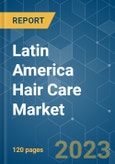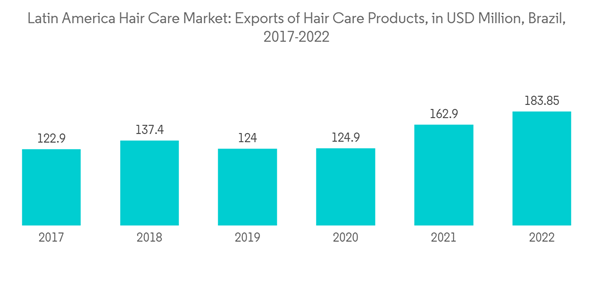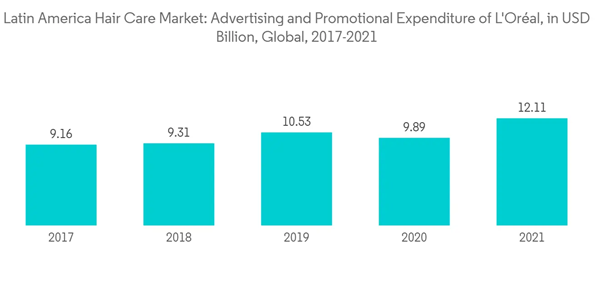Key Highlights
- The idea that natural substances are "better for you" has always been prevalent and deeply entrenched among Latin American consumers of cosmetics and personal care products. However, as Latin American beauty consumers become more aware and as the value of natural, organic, and/or vegan components rises globally, "fully backed" claims will become more and more important.
- Additionally, scalp care, anti-pollution, UV protection, and detoxifying treatments are becoming more and more popular among customers as a result of climate change and rising pollution. Beauty firms have an opportunity to interact with the local consumer base by utilizing personalization through products that are tailored to regional preferences and cultures.
- Under the hair care market, Latin American consumers continue to adopt a more rational approach toward purchases of hair care items. More specifically, Brazil is expected to be a highly demanding market in the region owing to its diversity, population size, and consumer engagement level. Millennials are currently adopting the global trend of self-acceptance by embracing their natural textures and curls owing to that straight hair is considered a beauty standard.
- As per the statistics given by L’oreal, more than 40% of female consumers have curly hair in Brazil, which promotes the company to launch a new product i.e. Elseve Óleo Extraordinário Cachos range (Elseve Extraordinary Curl Oil) which is introduced from curly to frizzy hair. It is prepared with coconut and some other oils which promote bouncy, ultra-soft, and shiny curls.
Latin America Hair Care Market Trends
Increasing Consumer Expenditure Towards Natural Hair Care Products
There has been increasing inclination towards plant extract ingredients in hair care products in Latin American countries, such as aloe and rosemary extract, and plant oils such as argan and jojoba oil due to their conditioning, regenerating and healing properties, with plant extracts mostly used in shampoos, and plant oils mainly found in conditioners, due to their emollient properties. There is also increasing use of natural sensory ingredients in hair care, as they render the scent and appearance of products more appealing, while also enhancing their performance. For instance, in February 2022, Sephora a retailer of personal care and beauty products helps Carolina Contreras an afro-Latina beauty influencer launch a line of natural hair care products. Under the direction of Sephora's Accelerate program, Contreras' products will be offered at their retail locations.During the previous years, the main strategy of companies to capture the attention of consumers was towards the launch of hair care products with natural ingredients and environmentally friendly packaging. Among the most important of such brands is Sedal Bomba de Nutrición, from Unilever de Argentina SA, in standard shampoos and conditioners, with ingredients of natural origin, such as avocado and shea butter.
Increasing Expenditure on Advertisement & Promotional Activities
The companies operating in the Latin American hair care market have a strong portfolio of brands positioned to target different audiences in the region, moreover, these companies are continuously engaging in strong branding campaigns to increase their market share in the region studied.Latin American internet users are one of the most active users all over the world. It is one of the world's fastest-growing e-commerce marketplaces, and the digitally-connected consumers make the region ideal for beauty companies that can set the standard for effective digital marketing. Brazil is without a doubt the e-commerce hub of Latin America as it has one of the largest online markets. For instance, In August 2019, Grupo Boticário acquired the cosmetics e-commerce site "Beauty on the Web". The company trying to increase its share of internet sales through this acquisition. In Beauty on the Web, more than 360 national or international hair, skin, perfumery, body, and makeup brands are sold.
Promotions and discounts in Argentina have been the main strategy to try to maintain sales of hair care during the previous year. Promotions of type two for the price of one, or a second item with a significant discount were very frequent, thus driving the sales forward in the market studied.
Latin America Hair Care Industry Overview
The hair care market in Latin America is moderately fragmented. Some of the prominent companies operating in the Latin American hair care market are Unilever, L'Oreal, S.A., and Procter & Gamble. The key players have increasingly strategized on gaining larger market shares in these countries, via constant product innovation, merger and acquisition, advertisement expenses, and R&D investments, to develop niche products. In 2022, P&G spent around USD 1.4 billion on acquisitions, majorly related to the purchase of skincare brands Farmacy Beauty and Tula and haircare company Ouai.Additional Benefits:
- The market estimate (ME) sheet in Excel format
- 3 months of analyst support
This product will be delivered within 2 business days.
Table of Contents
Companies Mentioned (Partial List)
A selection of companies mentioned in this report includes, but is not limited to:
- Unilever PLC
- Procter & Gamble Company
- L'Oreal S.A.
- Henkel AG & Company, KGaA
- Johnson & Johnson Services, Inc.
- Genomma Lab Internacional S.A.B. de C.V.
- Coty Inc.
- Santiago Saenz S.A.
- Alticor (Amway)
- Embelleze
- Grupo Coala do Brasil
- Forever Company Cosmeticos LTDA










